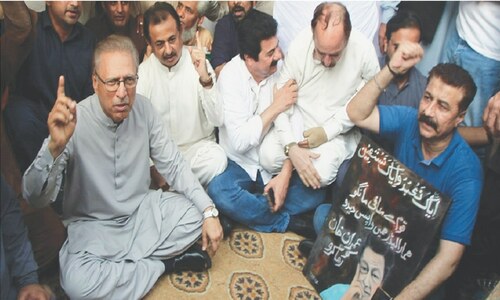
ISLAMABAD: The government kept its cards close to its chest on Saturday, the last working day before it is to testify in the Lahore High Court (LHC) on jailed CIA operative Raymond Davis’s diplomatic status. Indications of the possibility of the government sticking to its time buying tactics were, nevertheless, quite evident. None of the government spokespersons was ready to say anything on the strategy in the Davis case. Instead they suggested waiting till Monday.
On Monday the LHC will resume its hearing on petitions against possible handover of Davis to the US authorities after a break of three weeks sought by the government to file a reply. This was the second adjournment granted by the court to the government for preparing its response, which essentially pertains to his diplomatic status and immunity.
But, well placed sources indicated that the government would seek to buy more time to keep the option of an ‘out of court’ settlement open, even if the court pressed its representative to certify on Davis’s status.
At best the government’s counsel could furnish some basic facts about Davis — a January 2010 notification issued by the US embassy about his appointment, his diplomatic passport and a pending request for registration with the Foreign Office. But the counsel is likely to stop short of unequivocally stating whether or not the murder accused enjoyed diplomatic status.
An official requesting anonymity because of the sensitivity of the issue disclosed that none of the replies to four queries to be presented to the LHC addressed the question of immunity — clearly suggesting that the dispute that has been ominously threatening Pakistan-US strategic relationship would continue to linger.
Legal experts say the question before the court would be as to which document — the embassy’s appointment notification or registration with the Foreign Office — formed the basis for diplomatic status and associated privileges and immunities.
Officials in private conversations said the Foreign Office’s Blue Book (protocol manual) was very clear that only the registration card issued to a diplomat after his/her registration with the Foreign Office confirmed anyone’s diplomatic status — something Davis was yet to get even though his request had been pending for over a year.
The government was expected to tell the court that the issue was very complicated and had to be looked at from all aspects, including international law, international practice, local laws and American laws.
“We have to take into consideration all of these laws and practices. Therefore, we are not in a position to give a blanket response,” an official said.
The Vienna Convention on Diplomatic Relations of 1961 has no requirement for a diplomat to register in the host country for getting immunity and other privileges. Accordingly, most countries do not have a registration requirement for foreign diplomats, but it is a legal requirement in Pakistan.












































Dear visitor, the comments section is undergoing an overhaul and will return soon.